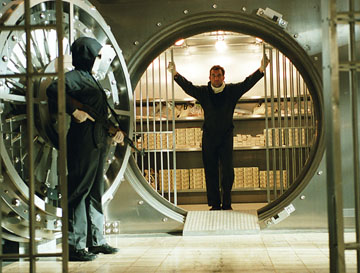INSIDE MAN

Reviewed by Sam Hatch
AS THIS IS PART OF A YEAR-END DISCUSSION AS OPPOSED TO A TRADITIONAL REVIEW, THERE MAY BE SPOILERS PRESENT IN THE TEXT.
I've always had a love/hate relationship with the work of Spike Lee. When he's on, he's on - but even a strong start from one his films doesn't mean he won't derail it before the end of the story. His recent work is hit or miss. Summer of Sam was a mixed bag; Bamboozled was an interesting idea that ultimately failed to cohere. I missed She Hate Me, but I remember being really excited about seeing The 25th Hour. Sadly, an unfocused script, Terence Blanchard's heavy-handed score, and the director's ill-fitting agenda ruined that one despite some excellent work from the cast.
Needless to say, I wasn't sure whether or not I should get my hopes up for Inside Man. As a Spike Lee joint, it's an aberration, since it's his first foray as a 'director for hire'. The script (by Russell Gerwitz) was already written for Ron Howard to helm, and Spike was chosen instead to bring it to the screen. This makes me think back to a director's roundtable article in a 1997 Premiere issue in which Spike claimed that despite his being considered an important director, his race would preclude him from being offered popular scripts such as Air Force One. He was quickly countered by the African-American directorial team the Hughes Brothers, who stated that they were offered that script before it was given to Wolfgang Peterson.
It's too bad he hasn't done too much work as a hired gun, since he lends so much of his own quirky style to a film that could have been a rather run of the mill Howard film. His cast is stellar, with Clive Owen and Denzel Washington chewing up most of the scenery. Still, the supporting cast should not be slighted, as Chiwetel Ejiofor, Christopher Plummer, Willem Dafoe and Jodie Foster bring their characters to life with undeniable skill. The script is brilliant, as it reinvents the concept of the heist film and acknowledges how changes in technology have altered the playing field greatly. One early scene involving an errant cell phone with a Kanye West ring tone is grippingly effective. Owen's cool demeanor is perfect for a difficult role, which must retain our interest even while he procrastinates mysteriously throughout most of the film.
Lee's personal touches are injected throughout the feature, the biggest being the notion to include New York City as an extra character. The film is loaded with scenes in which the architecture of the bank's surrounding area is shown in loving detail. In fact, the film is often edited in such a way that instead of reaction shots of characters, we are transferred to images of the outside of the bank building as if we're watching the reaction of the city. Lee's trademarked overexposed white scenes are mainly used for a periodic series of comedic post-heist vignettes, as Washington and his partner (Ejiofor) cross-examine the multiple hostages in an effort to ferret out potential snakes in the grass. He even manages to sneak in his trademarked 'floating subject' spin on the classic push/pull zoom as Denzel literally appears to float down the street when he fails to save a hostage's life.
Unlike The 25th Hour (in which he shoehorned a 9/11 commentary into a narrative that had nothing to do with that tragedy), Lee manages to subtly showcase his rage with a wall covered in 'Never Forget' graffiti. Race is explored, and sometimes borders on the annoying, ham-fisted side (what's the chances that the sole Arabic character we see doesn't get embroiled in some sort of 'towel head' imbroglio? - not to mention the white beat cop who suddenly feels the need to explain his dislike of non-whites to Washington's character), he reels it in before it unravels the otherwise tight script. Perhaps he learned a lesson from the egregious excesses of Paul Haggis' Crash.
Blanchard's score is much better this time around, though sometimes his brooding theme for Owen clashes with Washington's jazzy funk theme when he feels the need to cut back and forth between the two cues to match the visual edits. Speaking of the music, the techno-infused Bollywood number that opens the film (A.R. Rahman's ‘Chaiyya Chaiyya') was another off-kilter yet completely inspired choice. It's a testament to Lee's talent that he was able to introduce all of these quirky, personal elements into the film without losing sight of the airtight heist storyline along the way.